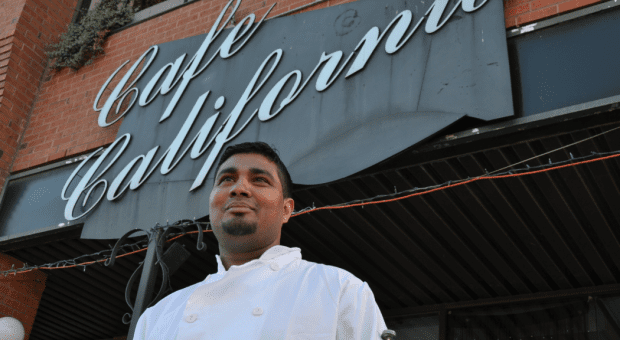
Jay Kunasingam is the new owner of Café California on Church Street. Credit: Andrea Houston
After 17 years in the kitchen at Café California, Jay Kunasingam has come out from behind the grill to purchase the long-time Church Street restaurant.
“For me this place is like my family,” he says. “This place is a part of the community, and I want to keep it that way.”
The previous owner, Vince Moneva, who owned the café for more than 20 years, told Xtra last year that the economic downturn hit his business hard and that he was thinking of selling. Moneva finally put the restaurant on the market in July.
Kunasingam has kept on all the old staff and plans to keep the name, although he is planning to renovate this winter and newly designed menus will arrive next month.
“Next year is WorldPride, so we want everything to look really good,” he says. “The world is coming to Toronto.
“Everyone seems to be happy, and if the customers are happy, I’m happy . . . It’s important to support independent businesses. We have to keep this community alive.”
Across the street, Pusateri Fruit Market, which celebrated its 45th anniversary last year, is also under new ownership.
Pusateri has felt the pinch since Loblaws moved in at Church and Carlton in 2011 but has held on, mostly thanks to loyal customers who value high-quality produce.
Co-owners Tony Cerminara and Frank Mangione sold the store at the beginning of September. Cerminara says Loblaws wasn’t the only reason they decided to sell.
“Frank and I just wanted a change,” he says. “It was too much for us going seven days a week. We’re not getting any younger. The couple that bought it are a younger couple, and we felt they could inject some cash into renovating the store.”
New owner Helen Lin wasn’t available for comment, but long-time staffer Marcy Rogers says she’s pleased that everything will stay the same.
“Helen loves the staff and loves the store,” she says. “This is a dream for her. We’re all very happy.”
Meanwhile, just down the street at Church and Maitland, the Shisha Club has opened in the space above the UPS Store.
The casual and friendly café occupies two floors, with lots of soft couches and chairs for curling up with a hookah pipe.
Shisha is a flavoured herb that’s covered with foil and roasted with charcoal, then smoked through a tall decorative water pipe. The practice is growing in popularity in Toronto, but shisha has been used for centuries, primarily in Africa, Asia and the Middle East.
The aromatic flavour comes from fruit molasses such as apple, rose and strawberry, which makes the smoke taste and smell sweet.
Owner David A (he declined to provide his last name) says he plans to serve coffee, tea and desserts. He says smoking shisha is relaxing and social, and he hopes it fits in well with the gay community culture.
“It’s a very cool street with very nice people and good opportunity for business,” he says. “There has never been a hookah place on Church Street, and much of the population in this area are smokers.”
David owns another Shisha Club at Yonge and Dundas. “It’s fun, we play music, and the atmosphere will be like a nightclub,” he says. “We want to bring something to the neighbourhood that you don’t have here.
“During Pride Week, we had so many customers coming in to our other location, so we realized that we can bring it to them.”
It’s noteworthy to mention that hookah lounges are not included as part of Toronto’s anti-smoking bylaw or the Smoke-Free Ontario Act. Toronto Public Health spokesperson Kris Scheuer says shisha is herbal.
Scheuer says Toronto Public Health is collecting research on shisha and plans to draft a report eventually on the issues and any possible health warnings.
“But for now, there’s no Toronto bylaw or provincial smoke-free legislation that covers it because it’s not a tobacco product,” she says. “As far as we know, shisha does not contain tobacco.”

 Why you can trust Xtra
Why you can trust Xtra


